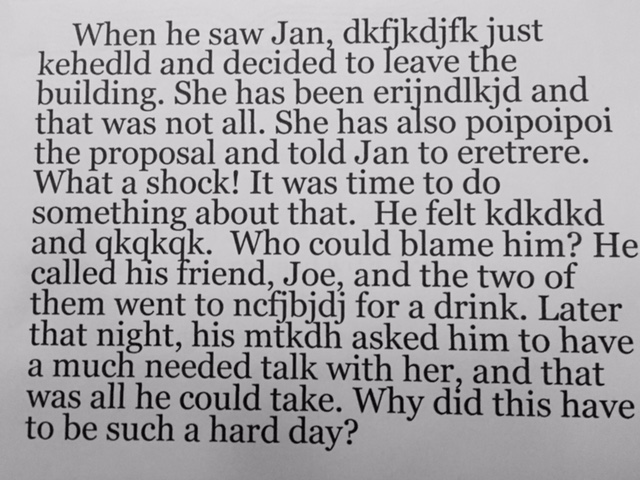Try reading the passage below. Is it difficult for you to understand? Believe it or not, this is what it looks like when a child reads with 91% accuracy. That might seem high, but is it enough to comprehend?

When children do not read with 98% accuracy, it affects their comprehension. How can they understand fully what they are reading when words are either left out or misread? This might be misdiagnosed as a comprehension issue if the child is reading silently and answers questions incorrectly. As you can see, the core issue in this case is decoding. If the child cannot lift the words off the page, he or she will not derive meaning. Viewing this solely as a comprehension problem overlooks the root cause.
While the goal of reading instruction is always comprehension, systematic phonics instruction must occur in the primary grades and be taught thoroughly to form the foundation for comprehension. “There is no comprehension strategy powerful enough to compensate for the fact that you can’t read the words,” stated Dr. Anita Archer in her excellent book, Explicit Instruction. If there are gaps in children’s understanding of the alphabetic principle, it will affect their performance in the upper grades. We can all agree that reading without meaning lacks purpose, and writing without coherent ideas is meaningless. Once foundational skills are mastered and stored in long term memory, the brain can be actively engaged to read for comprehension.
(High Five Literacy and Academic Coaching is located in Plainview, Long Island.)
*If you found this post informative or interesting, please follow my blog by entering your email below. You will be notified by email whenever a new post is published.

8 Comments. Leave new
Interesting way to bring one’s attention to
the problem that may exist.
How would a parent know if deciding is a problem?
[…] my earlier post, “Reading Comprehension Problem? Maybe Not,” I tried to have readers look at decoding as the root cause of comprehension problems. […]
Yes. My son reads on 3rd percentile Speed and 5th percentile Accuracy but Comprehension can be as high as 70th percentile.
Comprehension is dependent on familiarity with the text content, it doesn’t reflect comprehension in lower years of kids who are cultured and highly verbal, because they answer from knowledge.
If you can not infer meaning from the text because you are not knowledgeable on the content and you cannot decode, you can not learn through reading.
How can you contextual guess what you do not know?
Kids that are poor decoders are not just disabled from learning to read, it also prevents them from reading to learn.
Pull up a word list of words the kid should know. it actually a googleable term. Then have the kids read the words to you. there is no context clues so the child cannot use any tips or tricks to recognize the word. If the child cannot pronounce the word ask the child to divide the word up into its parts.
Interesting!
Great post!
This makes such an excellent point! For the last 30 years, (as a sped teacher) I have counted sentences with miscues, not words. This ratio provides me with a more accurate picture of the impact of miscues on comprehension.